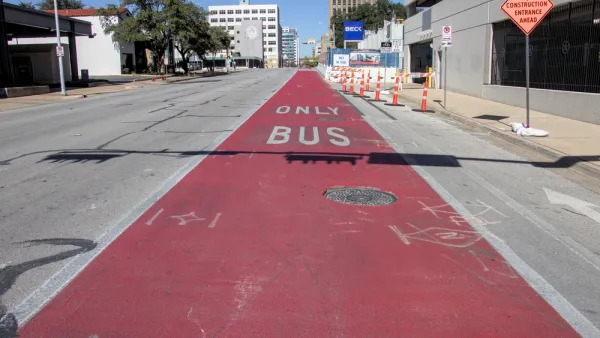The details of drastic reductions to the proposed building program for Austin’s Project Connect long-range transit plan are now open for public comment.

The Austin Transit Partnership (ATP), the government corporation empowered to finance and develop the Project Connect long-term transit plan in Austin has released a proposed revision of the plan, as promised after cost increases forced reductions to the plan.
Nathan Bernier reports for KUT on the revisions, which were leaked earlier this month, but made public on Tuesday, March 21 at a public meeting at the Austin Public Library.
ATP has spent months paring down Project Connect in preparation for the release this week. After seeing the costs for the Project Connect program balloon from an estimated $5.8 billion to $10.3 billion, the plan would now spend less than $5 billion, “including a whopping 40% cost contingency,” reports Bernier.
The ATP hopes a $3.5 billion cushion “will make its pitch more appealing to the federal government,” which is expected to fund up top half of the cost included in the Project Connect program.
The source article, linked below, includes details for each of the five remaining alternatives—all of which represent a significant reduction from the original plan Austin voters approved in the November 2020 election. The original plan called for two new light rail lines, four new rapid bus routes, and a new commuter rail line, as well as expanded service on the city’s existing commuter rail route, in addition to anti-displacement measures and on-demand transit shuttles.
Additional challenges could still await Project Connect if conservative members of the Texas State Legislature manage to approve a proposed bill that would limit ATP’s powers to finance projects. “The Austin Transit Partnership will collect public feedback over the next six weeks,” according to Bernier.
FULL STORY: Austin's light-rail plans have shrunk. Here are 5 new options.

Analysis: Cybertruck Fatality Rate Far Exceeds That of Ford Pinto
The Tesla Cybertruck was recalled seven times last year.

National Parks Layoffs Will Cause Communities to Lose Billions
Thousands of essential park workers were laid off this week, just before the busy spring break season.

Retro-silient?: America’s First “Eco-burb,” The Woodlands Turns 50
A master-planned community north of Houston offers lessons on green infrastructure and resilient design, but falls short of its founder’s lofty affordability and walkability goals.

Test News Post 1
This is a summary

Analysis: Cybertruck Fatality Rate Far Exceeds That of Ford Pinto
The Tesla Cybertruck was recalled seven times last year.

Test News Headline 46
Test for the image on the front page.
Urban Design for Planners 1: Software Tools
This six-course series explores essential urban design concepts using open source software and equips planners with the tools they need to participate fully in the urban design process.
Planning for Universal Design
Learn the tools for implementing Universal Design in planning regulations.
EMC Planning Group, Inc.
Planetizen
Planetizen
Mpact (formerly Rail~Volution)
Great Falls Development Authority, Inc.
HUDs Office of Policy Development and Research
NYU Wagner Graduate School of Public Service



























